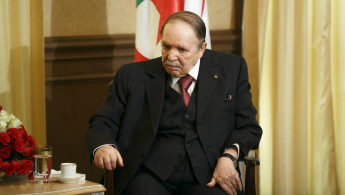Bouteflika 'seeks forgiveness' from Algerians following resignation
Former Algerian President Abdelaziz Bouteflika on Wednesday said he is seeking "forgiveness" from his compatriots as his resignation was formalised by Algeria's Constitutional Council.
The wheelchair-bound, ailing 82-year-old had ruled over Algeria for 20 years before resigning on Tuesday in the wake of mass protests against his bid for a fifth term as president.
Rarely seen in public since a 2013 stroke, Bouteflika in a farewell letter asked the Algerian people for forgiveness and urged citizens to "stay united, and never divide yourselves."
Algerians now face an uncertain future after Bouteflika's departure.
Abdelkader Bensalah, a 77-year-old ally of the former president and himself the president of the upper house of the Algerian Parliament, is expected to take over as interim leader before a date for the country's presidential elections - originally set for this month, but later cancelled in the face of public anger at Bouteflika - is set.
Many are worried, though, that the absence of Bouteflika may only serve to enable a political system seen as secretive, elitist and corrupt and further empower the military.
The appointment of Bensalah, who has led the upper house for most of Bouteflika's tenure, will do letter to quell fears that Algerians' fight against authoritarianism is not over yet.
The 12-member Constitutional Council formally notified the parliament that Algeria no longer has a president on Wednesday. Both chambers of the national legislature are expected to meet to name the president of the upper house as interim leader for 90 days while elections are organised.
As Bouteflika handed in his resignation on Tuesday night, he appeared pale and weak, and wore a traditional robe instead of his habitual suits.
Bouteflika acknowledged that some of his actions as president had been less than successful, writing in a letter published state news agency APS: "I ask your forgiveness for any failing toward you."
"I am leaving the political scene without sadness or fear, for the future of our country," he said, adding that he Algeria's new leaders would take the nation to "horizons of progress and prosperity."
Read more: Ending Bouteflika's Algeria: This is not the Arab Spring
The ailing former president described women and young people, who led the protest movement that forced him out of office, as "the beating heart of our nation".
He also praised those who fought alongside him for Algeria's independence from France and urged Algerians to live up to their example and honour their sacrifices.
Algerians celebrated his departure en masse with songs and flag-waving in the streets of the capital Algiers on Tuesday night.
Demonstrators have already planned protests for Friday, after six straight Fridays of colossal, peaceful demonstrations that took Algeria's entrenched leadership by surprise.
Bouteflika's expected successor Bensalah is known as a politician who works behind the scenes to strike compromises and solve problems, and who avoids controversial debates - and is very much part of the political elite.
Protesters are also worried about the role of Algeria's influential military and what Bouteflika's entourage will do next. Military chief of staff Ahmed Gaid Salah appeared to trigger Bouteflika's departure by pushing to get him declared unfit for office.
The United Nations - where Bouteflika often defended Third World countries as Algerian foreign minister in the 1960s and 1970s - offered Algeria support in its transition. The UN said on Wednesday that Secretary-General Antonio Guterres "salutes the mature and calm nature in which the Algerian people have been expressing their desire for change."





 Follow the Middle East's top stories in English at The New Arab on Google News
Follow the Middle East's top stories in English at The New Arab on Google News
![The UAE is widely suspected of arming the RSF militia [Getty]](/sites/default/files/styles/image_330x185/public/2024-11/GettyImages-472529908.jpg?h=69f2b9d0&itok=Yauw3YTG)
![Netanyahu furiously denounced the ICC [Getty]](/sites/default/files/styles/image_330x185/public/2024-11/GettyImages-2169352575.jpg?h=199d8c1f&itok=-vRiruf5)
![Both Hamas and the Palestinian Authority welcomed the ICC arrest warrants [Getty]](/sites/default/files/styles/image_330x185/public/2024-11/GettyImages-2178351173.jpg?h=199d8c1f&itok=TV858iVg)